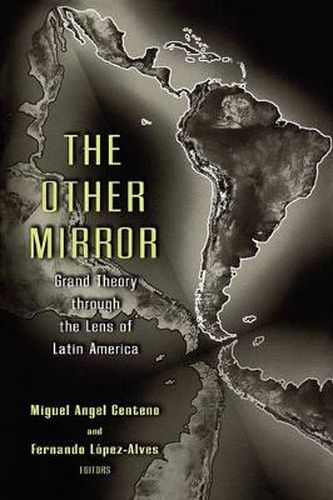Readings Newsletter
Become a Readings Member to make your shopping experience even easier.
Sign in or sign up for free!
You’re not far away from qualifying for FREE standard shipping within Australia
You’ve qualified for FREE standard shipping within Australia
The cart is loading…






If social science’s ??i??cultural turn??i??i??‘ has taught us anything, it is that knowledge is constrained by the time and place in which it is produced. In response, scholars have begun to reassess social theory from the standpoints of groups and places outside of the European context upon which most grand theory is based. Here a distinguished group of scholars re-evaluates widely accepted theories of state, property, race, and economics against Latin American experiences with a two-fold purpose. They seek to deepen our understanding of Latin America and the problems it faces. And, by testing social science paradigms against a broader variety of cases, they pursue a better and truly generalizable map of the social world. Bringing universal theory into dialogue with specific history, the contributors consider what forms Latin American variations of classical themes might take and which theories are most useful in describing Latin America. For example, the Argentinian experience reveals the limitations of neoclassical descriptions of economic development, but Charles Tilly’s emphasis on the importance of war and collective action to statemaking holds up well when thoughtfully adapted to Latin American situations. Marxist structural analysis is problematic in a region where political divisions do not fully expresses class cleavages, but aspects of Karl Polanyi’s socioeconomic theory cross borders with relative ease. This fresh theoretical discussion expands the scope of Latin American studies and social theory, bringing the two into an unprecedented conversation that will benefit both. The contributors to this book are, in addition to the editors, Jeremy Adelman, Jorge I. Dominguez, Paul Gootenberg, Alan Knight, Robert M. Levine, Claudio Lomnitz, John Markoff, Veronica Montecinos, Steven C. Topik, and J. Samuel Valenzuela.
$9.00 standard shipping within Australia
FREE standard shipping within Australia for orders over $100.00
Express & International shipping calculated at checkout
If social science’s ??i??cultural turn??i??i??‘ has taught us anything, it is that knowledge is constrained by the time and place in which it is produced. In response, scholars have begun to reassess social theory from the standpoints of groups and places outside of the European context upon which most grand theory is based. Here a distinguished group of scholars re-evaluates widely accepted theories of state, property, race, and economics against Latin American experiences with a two-fold purpose. They seek to deepen our understanding of Latin America and the problems it faces. And, by testing social science paradigms against a broader variety of cases, they pursue a better and truly generalizable map of the social world. Bringing universal theory into dialogue with specific history, the contributors consider what forms Latin American variations of classical themes might take and which theories are most useful in describing Latin America. For example, the Argentinian experience reveals the limitations of neoclassical descriptions of economic development, but Charles Tilly’s emphasis on the importance of war and collective action to statemaking holds up well when thoughtfully adapted to Latin American situations. Marxist structural analysis is problematic in a region where political divisions do not fully expresses class cleavages, but aspects of Karl Polanyi’s socioeconomic theory cross borders with relative ease. This fresh theoretical discussion expands the scope of Latin American studies and social theory, bringing the two into an unprecedented conversation that will benefit both. The contributors to this book are, in addition to the editors, Jeremy Adelman, Jorge I. Dominguez, Paul Gootenberg, Alan Knight, Robert M. Levine, Claudio Lomnitz, John Markoff, Veronica Montecinos, Steven C. Topik, and J. Samuel Valenzuela.